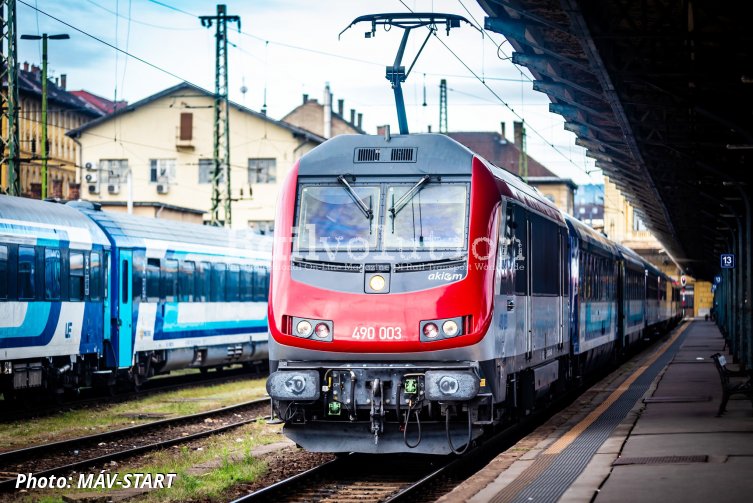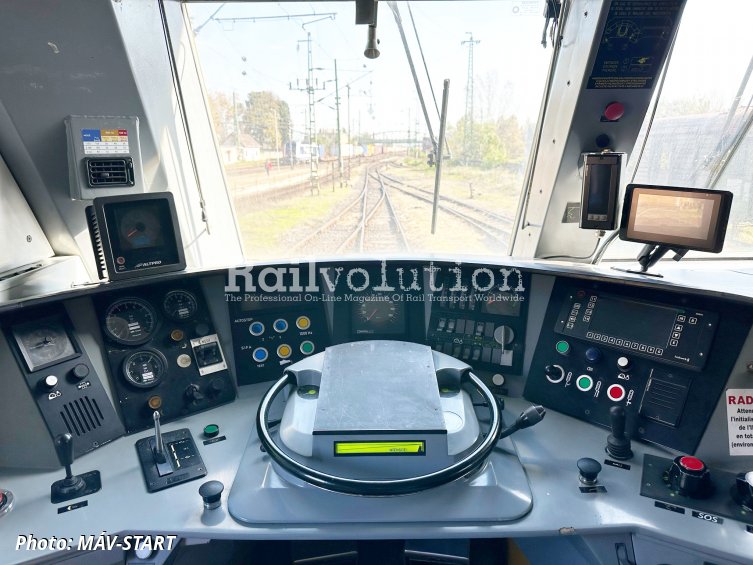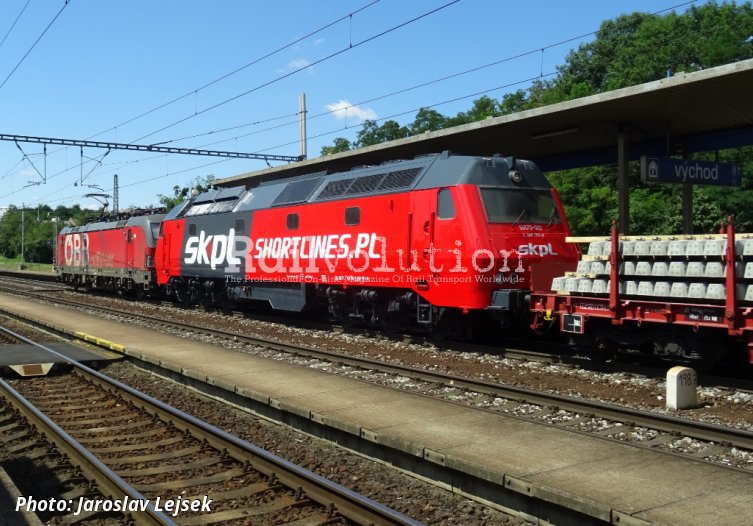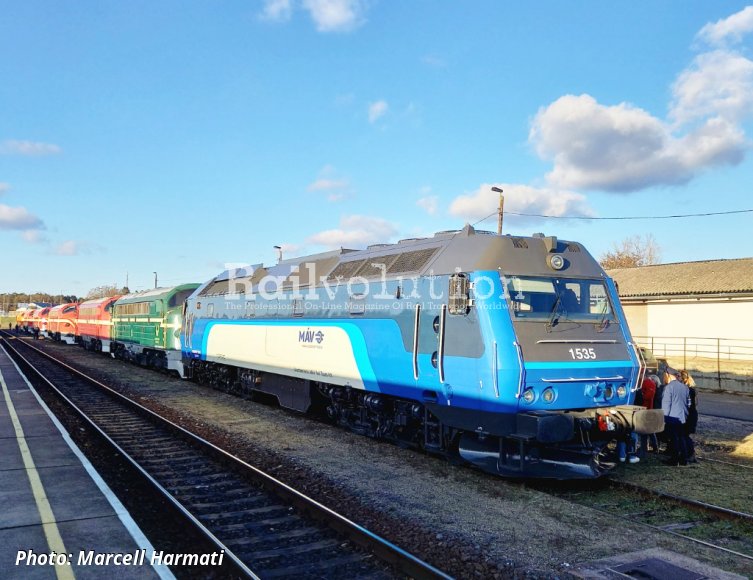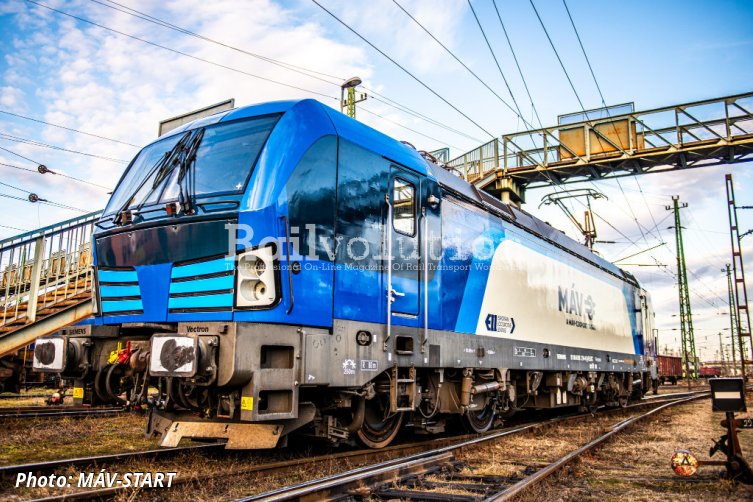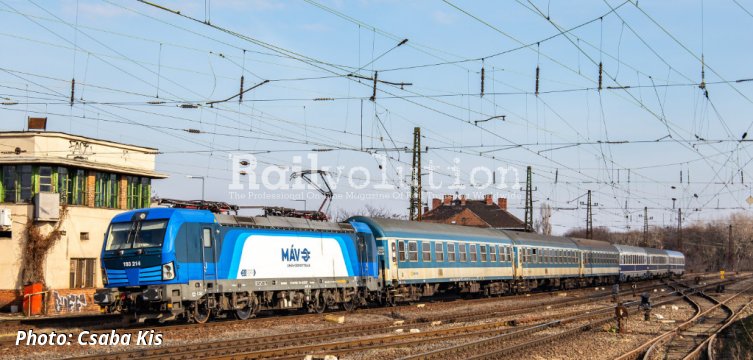Hungarian news round-up
posted on 19th Feb 2025 10:32
Hungarian railways have been struggling with a lack of funding in recent years. This is reflected, for example, in the fact that the only major ongoing project for the purchase of new passenger rail vehicles in Hungary is currently the order for FLIRTs for GYSEV.
In May 2023, the plan to procure 115 Vectrons under the April 2022 framework contract collapsed. While this was the result of disputes between the Hungarian government and the EU over the expansion of the Paks nuclear power plant, with the Minister of Construction and Transport János Lázár announcing that the government would "end its friendship with Siemens", it was still mainly a proxy for the fact that the government was unable to secure sufficient funding to purchase new vehicles.
Similarly, the intention to acquire non-traction multiple units of the railjet type was already in place, following the government approval on 7 September 2022 for the purchase of 39 NMUs for MÁV-START, with an option for ten more, which was to replace the existing domestic programme of IC+ cars. This was to be the largest fleet renewal in international long-distance transport at MÁV: a total of 380 cars would renew approximately two-thirds of the fleet dedicated to these services. However, this tender was also cancelled, in December 2022, again due to lack of funding.
In spite of this, MÁV-START is trying to renew its fleet of powered vehicles, as some classes have really exceeded the limits of acceptable age (in electric traction, these are the original Class V43 locomotives, now Classes 431, 432 and 433, with a maximum speed of 120 km/h). According to the action plan announced by the Minister of Transport at the end of summer 2024, MÁV-csoport (MÁV Group) is continuously implementing, within the financial possibilities, the leasing and modification of vehicles from different lessors as a temporary solution, in parallel with the preparation of the purchase of new-built vehicles.
Akiem's Tauruses
The first such case was the lease of 15 Type ES64U2 Tauruses from Akiem under a contract dated September 2023. It was concluded by MÁV Rail Tours, a subsidiary of the MÁV Group, which organises nostalgic and charter journeys. MÁV-START then uses the locomotives in question under a cooperation agreement with MÁV Rail Tours. Akiem's Tauruses are deployed both on domestic IC lines and on EC trains to Austria, where since last year, as part of the vehicle mileage compensation between ÖBB and MÁV-START, they have been used more extensively on domestic Austrian services.
Akiem's Astrides
Another success of Akiem, which opened its office in Budapest in 2018, is the lease of Astride locomotives from MÁV-START, the original Class BB 36000, which were taken over from Fret SNCF in 2009 (Akiem itself was founded in 2008). The Astrides have been running in Hungary since 2018, redesignated as Class 490, maintained at the Komárom depot, together with the PRIMA locomotives of the original Class BB 27000, now Hungarian Class 491, also formerly produced by Alstom. The locomotives have been given wider pantograph skids than in the SNCF's original design and have been fitted with MIREL VZ1 ATP for operation in Hungary and, in the case of Astrides, Indusi for running in Croatia and Slovenia (approval of PRIMAs in both these countries is planned).
By the end of 2024, fifteen 490s and five 491s were in service in Hungary. For example, locomotives 490 003 and 006 - 009 were leased to the Croatian operator Transagent from 2020 to August 2024, which used them mainly for container trains to/from the port of Rijeka. However, Transagent has now switched to Vectrons, because Astrides have not proven themselves in the freight traffic from Rijeka on the steep gradients, so the last one to be released from this operator was 490 006 (ex BB 36024) in August 2024.
These 15 Astrides have been leased by MÁV-START (again over MÁV Rail Tours) since mid-October 2024. First, modifications were made to 490 003 (retrofitting of carriage door controls and displays of CCTV at the driver's desks), which then made a successful test run on 8 October 2024 between Budapest and Hatvan with a rake of night and IC cars.
Another milestone was the start of the test passenger service with 490 003 on 27 January 2025 on the IC trains between Budapest and Pecs. In this regime, the locomotive must reach a mileage of 40,000 km (the operational reserve is 490,006). If the test service is successful, a contract for 15 locomotives and 12 option locomotives will be signed. MÁV-START plans to use the Astrides until the arrival of the new powerful electric locomotives with ETCS. However, it was not specified for how many years the contract was signed.
Nordic Re-finance's TMEs
On 18 December 2024, another premiere on Hungarian tracks took place, this time in diesel traction with a Class TME locomotive. A total of 15 originally Danish diesels will be leased on a long-term basis from Swedish leasing company Nordic Re-finance, again over MÁV Rail Tours. These 37 locomotives, which were built for DSB in 1981 - 85 in Kassel by Henschel as the Class ME with numbers 1501 - 1537, are assessed as still in good condition for further use, although after some four decades they certainly cannot be described as youngsters (just their high reliability was MÁV-START's argument for the lease).
Their replacement at DSB was once supposed to be the IC3 and IC4 DMUs from Ansaldobreda, but due to their unreliability and the cancellation of (the rest of) the contract, Danish Railways took the way of greater electrification of the lines, so the Class ME diesels were mainly replaced by Class EB Vectrons. The last of the ME locomotives, with a Co'Co' axle arrangement, an original top speed of 175 km/h and a diesel power of about 2,500 kW, was withdrawn on 11 December 2021.
From this fleet, 27 locomotives were sold to Nordic Re-Finance, redesignated as Class TME and destined for lease and resale. The Polish company SKPL Cargo acquired six machines (1503, 1505, 1511, 1517, 1522, 1532) and within the framework of "polonization" three of them were designated SU175-001 to 003 according to the old Polish scheme, but they have not yet received approval from UTK. All 15 TME machines for MÁV-START will be leased from Nordic Re-Finance.
The first to arrive in Hungary was on 30 July 2024 locomotive 1535 in the colours of the Danish company ContecRail. The second one was 1517 on 3 September, in SKPL colours and designated SU175-002, but via the Nordic Re-finance pool (its complete EVN is DK-SKPL 92 86 0 001 517-8). Both locomotives were sent to the Dombóvár depot (approximately 160 km south-west of the capital) for technical modifications. The locomotive with the old/new number 1535 was approved after tests in early December and then moved from Dombóvár to Budapest on 18 December 2024.
On 21 December, for the first time, 1535 took passengers, in a nostalgic train with a few Nohab locomotives, a traditional pre-Christmas train between Budapest and Tapolca. Since then, it has been deployed only on various special trains or freights for the purpose of achieving a certain number of kilometres in test operation, or to help out when another locomotive failed. At the end of February 2025, five TMEs were present in Hungary: 1517 and 1535 in test operation and 1504, 1524 and 1527.
According to the MÁV plans, the TMEs will operate instead of the Class 418 (formerly M41) and will be used mainly on the north bank of the Balaton (Line 29) and also on long tourist trains around the Balaton in the summer season. In the off-season they will be used in the Budapest agglomeration on the non-electrified line 142 Budapest - Lajosmizse or on the busiest non-electrified lines in western Hungary.
ELL's Vectrons
And most recently, MÁV-START is using Vectrons after all. These are not the ones from the April 2022 order, however, but again leased machines, in this case from ELL. In the first phase, three locomotives were used, the first of which, 193 214, arrived in Hungary at the end of January 2025. The drivers were trained on GYSEV Cargo's Vectrons, which were temporarily loaned to MÁV-START for this purpose and diagrammed on IC trains between Budapest and Békéscsaba.
193 214 was then on 4 February put into passenger service on the Budapest - Miskolc - Hidasnémeti/Sátoraljaújhely line, and more followed: 193 230 on 7 February and 193 227 on the 13th, 193 210 on 17 February. Then 193 216 and 723 arrived a other are in preparation. In total, MÁV-START is to have up to 40 Vectrons available from ELL, some this year, the rest in 2026. Neither the operator nor the Ministry of Transport have disclosed how many ELL's Vectrons are firmly contracted and how many are optioned and for how long.
The hired locomotives of the Classes 182 and 193 are dislocated at the Budapest-Ferencváros depot. The TME locomotives are assigned to the Vasúttörténeti Park (the Budapest Railway Museum, where MÁV Rail Tours is based); this is apparently valid only for the period of test operation, after which the TMEs should probably be located to the Dombóvár depot.
Ministerial plans
In an interview at the end of January this year, Transport Minister Lázár said that by the summer of 2026, almost half of the electric locomotives at MÁV-START are to be of modern design, representing the largest renewal of the locomotive fleet in decades. This should contribute to improving the reliability of passenger transport, especially on intercity routes, where about 90 % of IC services will be hauled by such machines (however, the condition of the carriages on these trains is somewhat behind the locomotives, as the intention to purchase NMUs has fallen). This year, MÁV-START plans to expand its fleet by a total of 55 leased locomotives, of which 15 are diesel and 40 electric, and by mid-2026 another 15 electrics are to be added.
The Minister further summarised that so far 1,200 km of railway lines have been renovated, including a large part of suburban lines, and KISS and FLIRT EMUs have been acquired. However, much of the network and rolling stock is at the end of its useful life (often past it, as shown by recent efforts to close many regional lines), so "extensive modernisation is needed, but this is hampered by the withholding of EU funds. Nevertheless, we are not giving up on this effort and there is a good chance that we will purchase significant numbers of additional units in Switzerland."
GYSEV
The ministry has prepared a ten-point package for the development of railways, which, in addition to the renewal of vehicles, includes the reform of the MÁV, a change in tariff policy and other steps, including taking over the majority role of the state in the GYSEV (Győr-Sopron-Ebenfurti Vasút, in German Raab-Odenburg-Ebenfurther Eisenbahn). After some two years of disputes, Hungary increased its stake in the Hungarian-Austrian company to two-thirds last year, buying out the stake of the Austrian construction firm Strabag after the Austrian antitrust authority approved the deal in September 2024. As a result, GYSEV/Raaberbahn, which has its roots in the days of the Austro-Hungarian monarchy, will now be split up after more than a century.
Let us recall that in the difficult period after the First World War, the Austrian state agreed in 1923 to change the concession charter of the company and issued its own concession for the lines on Austrian territory as an Austrian private railway. From then on, GYSEV/Raaberbahn, based in Sopron, operated two railways on the territory of Austria and Hungary in accordance with the laws of each country, with an independent ownership structure, economic management and accounting system, and was supervised by the respective ministries of transport of both countries.
Now, Austria will take over the existing Austrian part of the company, splitting it into the infrastructure and commercial divisions, with the former being integrated into ÖBB-Infrastruktur, similar to what happened with GKB infrastructure (Graz-Köflacher Bahn und Busbetrieb) in July 2024.
Thus, Hungary now has two state railway companies: MÁV and GYSEV. For the Ministry of Transport, this is an opportunity for GYSEV to take on a much larger role in Hungary, specifically in the north-west of the country and in passenger transport, thus freeing up resources (staff, vehicles) for MÁV.
And a fresh restructuring change is that on 1 January 2025 MÁV-START was transformed into MÁV szémélyszállítási as a combination of MÁV-START + Volánbusz (bus service) + MÁV-HÉV (suburban rail service in Budapest). MÁV szémélyszállítási is now the passenger service provider within the MÁV-csoport group.

